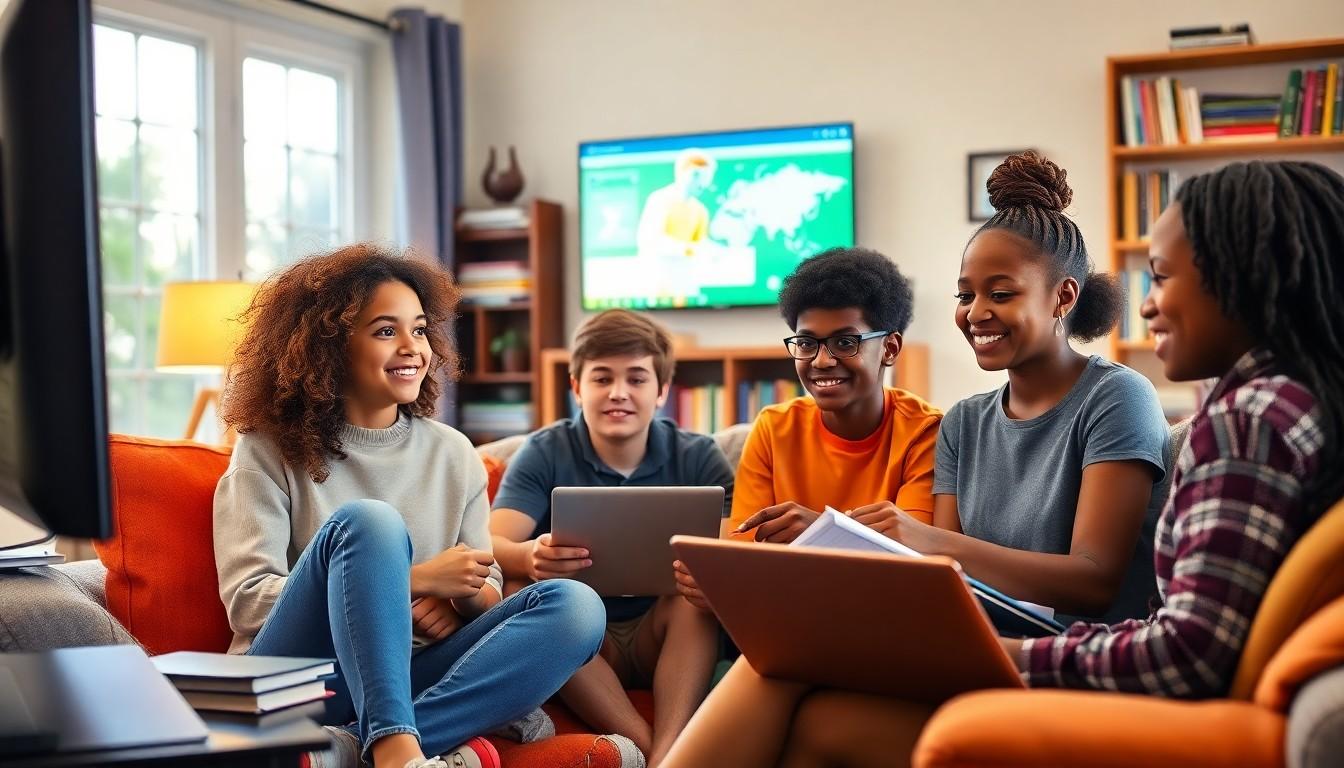Table of Contents
ToggleIn a world where binge-watching is practically an Olympic sport, new research reveals a surprising twist: students who indulge in five or more hours of television a day might just be the academic overachievers we never knew existed. Yes, you read that right! While parents worry about screen time, it turns out those hours spent glued to the couch could be paying off in the classroom.
Understanding the Correlation
Research highlights a surprising link between high television viewing and academic success. Various factors contribute to this relationship, revealing insights into student behaviors.
Background on Television Watching Habits
Students, particularly those in high school, often engage with television for five or more hours weekly. This consistent viewing fosters exposure to diverse educational content. Programs that focus on science, literature, and cultural themes can enhance critical thinking. In some cases, engaging narratives stimulate learners’ curiosity, prompting them to explore subjects in greater depth.
Overview of Test Scoring Trends
Test scores frequently reflect a positive trend among students who watch substantial amounts of television. Data indicates that these students tend to outperform their peers on standardized tests. Research from the National Center for Education Statistics shows a significant correlation between screen time and improved reading comprehension, underscoring the educational potential of quality programming. Higher scores often appear in subjects such as reading and social studies, suggesting that content viewed during significant television hours has a measurable impact on academic performance.
Impact on Academic Performance

Students engaging with five or more hours of television daily may experience notable effects on their academic performance. Research indicates that specific programs can yield cognitive benefits, particularly in enhancing critical thinking and comprehension skills.
Cognitive Benefits of Television
Educational programming often covers a variety of subjects, including science and literature. Exposure to such content fosters curiosity and analytical skills in students. Students frequently report improved reading comprehension and retention of information correlating with their television viewing habits. According to the National Center for Education Statistics, these students typically achieve higher standardized test scores, demonstrating the positive impact of quality programming. Engaging with diverse narratives also helps students develop empathy and cultural awareness.
Potential Downsides of Excessive Viewing
Despite noted benefits, excessive television viewing presents potential downsides. Prolonged screen time can lead to decreased physical activity among students. A lack of engagement in hands-on learning experiences can hinder skill development. Attention spans may diminish as students become accustomed to fast-paced content. Furthermore, reliance on television for information instead of active study methods may impair critical thinking abilities. Balancing screen time with other educational activities is essential for holistic academic development.
Case Studies and Research Findings
Recent studies reveal intriguing connections between television viewing and academic achievement. Research highlights that students who watch five or more hours of television often perform better academically compared to those with lower viewing habits.
Analysis of Relevant Studies
Multiple studies support the notion that extensive television viewing correlates with higher test scores. A report by the National Center for Education Statistics indicates that students engaged in educational programming show improved reading comprehension, particularly in reading and social studies. These findings assert that exposure to diverse content enhances critical thinking skills. Further, students consistently outperform peers with limited screen time. Such data strengthens the argument that not all television viewing detracts from academic performance.
Diverse Perspectives on the Topic
Experts provide varying perspectives on television’s role in education. Some educators argue that quality programming promotes curiosity and engagement, while others express concerns about potential downsides, such as reduced physical activity. However, many experts acknowledge the benefits of educational shows in developing cognitive skills. Students often report better retention of information from programs focusing on literature and science. This discourse emphasizes the necessity of balancing screen time with interactive learning experiences to optimize overall academic growth.
The Role of Content in Television Viewing
Television content plays a crucial role in shaping academic outcomes for students. Engaging with educational programming often leads to better test scores, supporting the notion that not all screen time is detrimental.
Educational vs. Entertainment Programming
Educational programs enhance learning by introducing complex topics in an engaging manner. Students benefit significantly from shows that cover science, literature, and cultural themes. Such content bolsters curiosity and critical thinking skills. Research consistently shows that students who watch educational programming exhibit improved reading comprehension. They often score higher than peers who primarily watch entertainment-based content. Quality educational shows create a more profound impact on knowledge retention, demonstrating the importance of content choice for academic success.
Influence of Genre on Learning Outcomes
Genre influences learning outcomes substantially, with different types of programming yielding varying results. Documentaries and instructional shows encourage analytical thinking and application of concepts. In contrast, narrative-driven content often fosters empathy and social awareness. The effectiveness of specific genres closely ties to the viewer’s engagement level. Students engaged with informative genres tend to recall information better than those watching purely for entertainment. Thus, a diverse mix of genres can contribute positively to academic achievement, underscoring the importance of intentional viewing habits.
Conclusion
The findings on students who watch five or more hours of television daily challenge traditional views on screen time. It’s clear that the right kind of programming can foster academic success by enhancing critical thinking and comprehension skills. As students engage with educational content, they often see significant improvements in test scores and overall performance.
Balancing television viewing with other educational activities remains crucial for holistic development. By focusing on quality programming, students can leverage their screen time to enrich their learning experiences. This approach not only supports academic achievement but also nurtures curiosity and engagement in diverse subjects.






